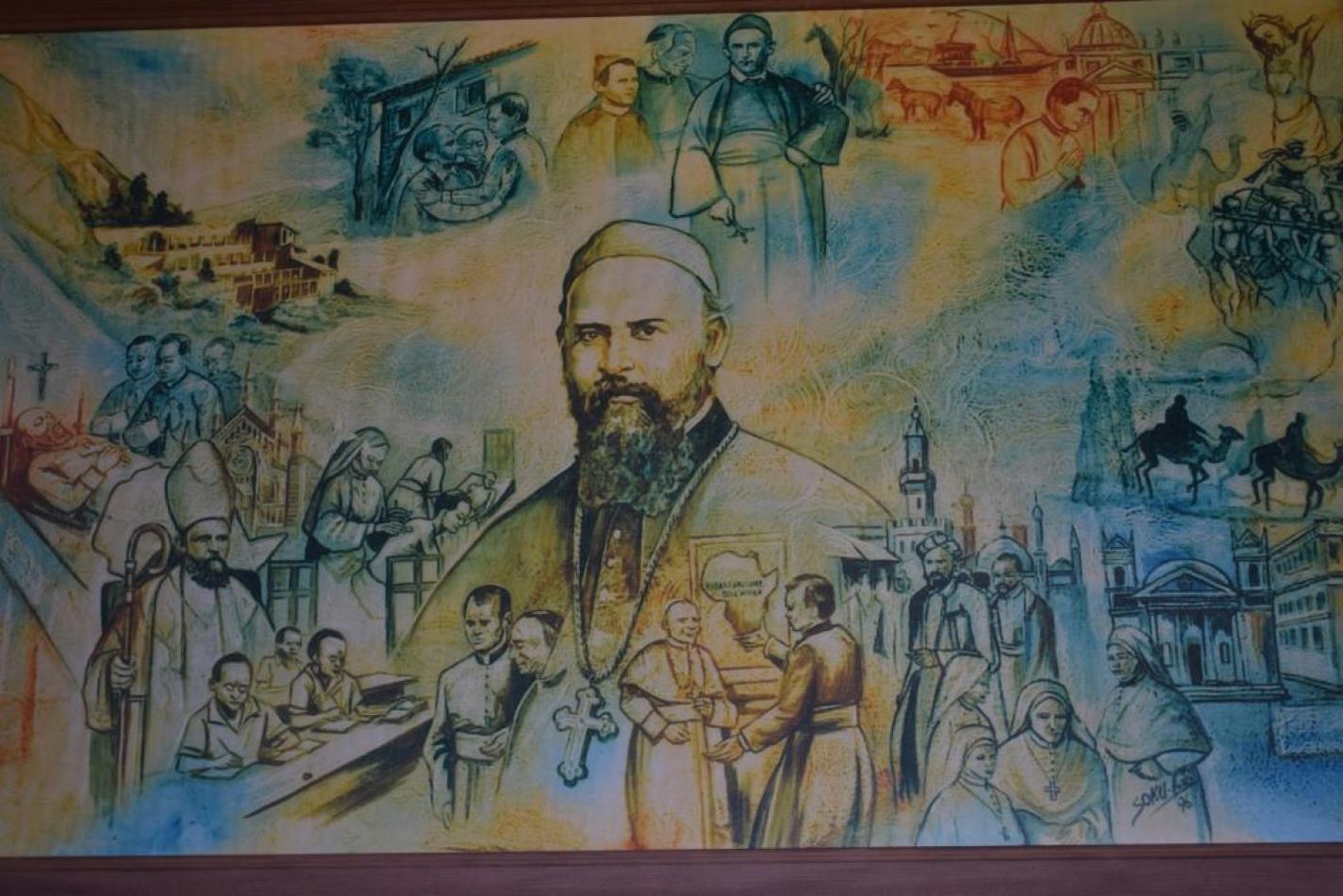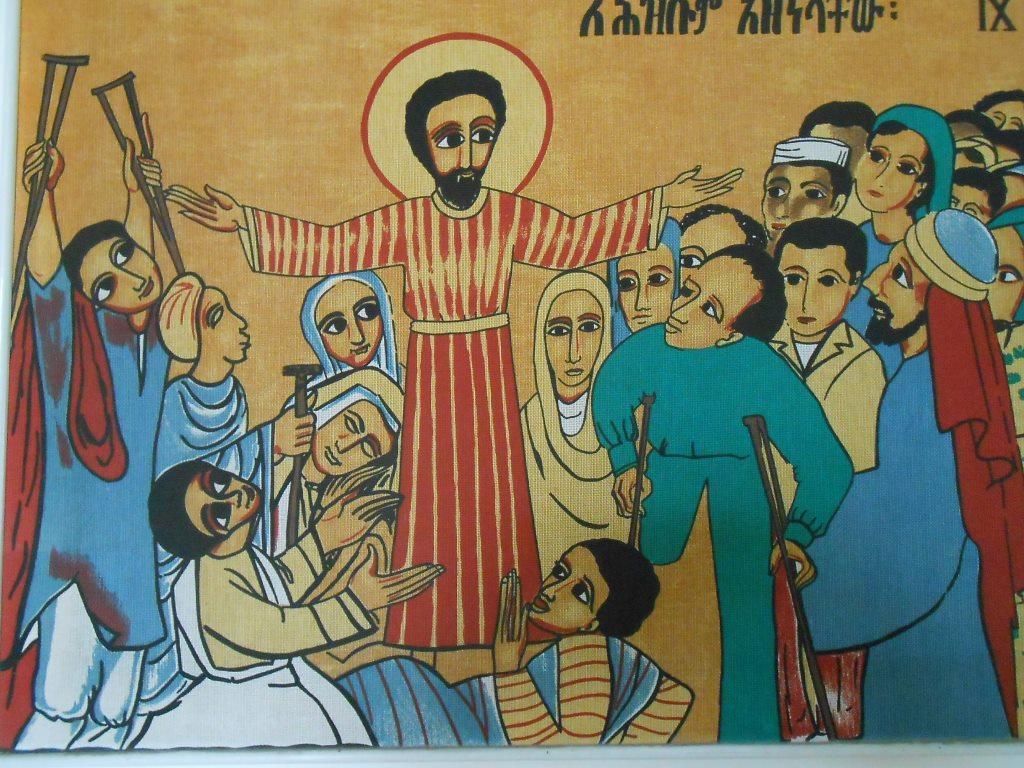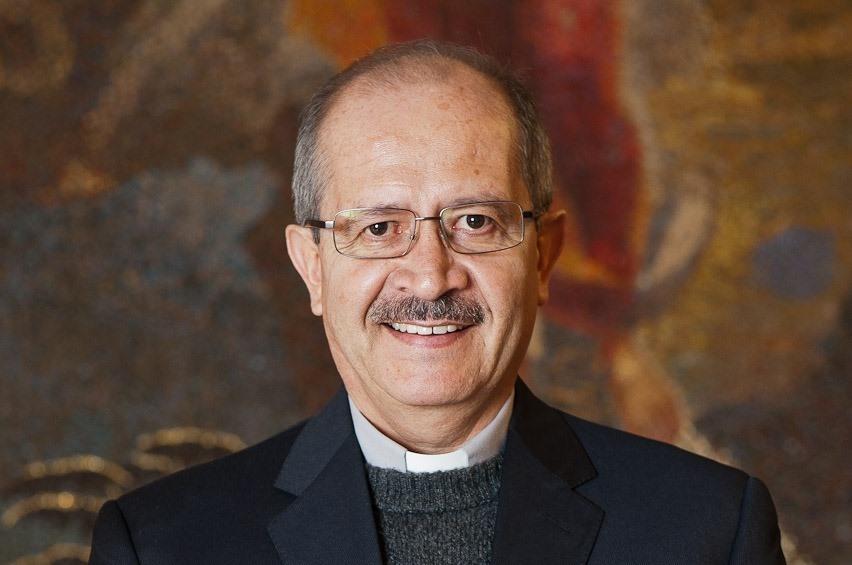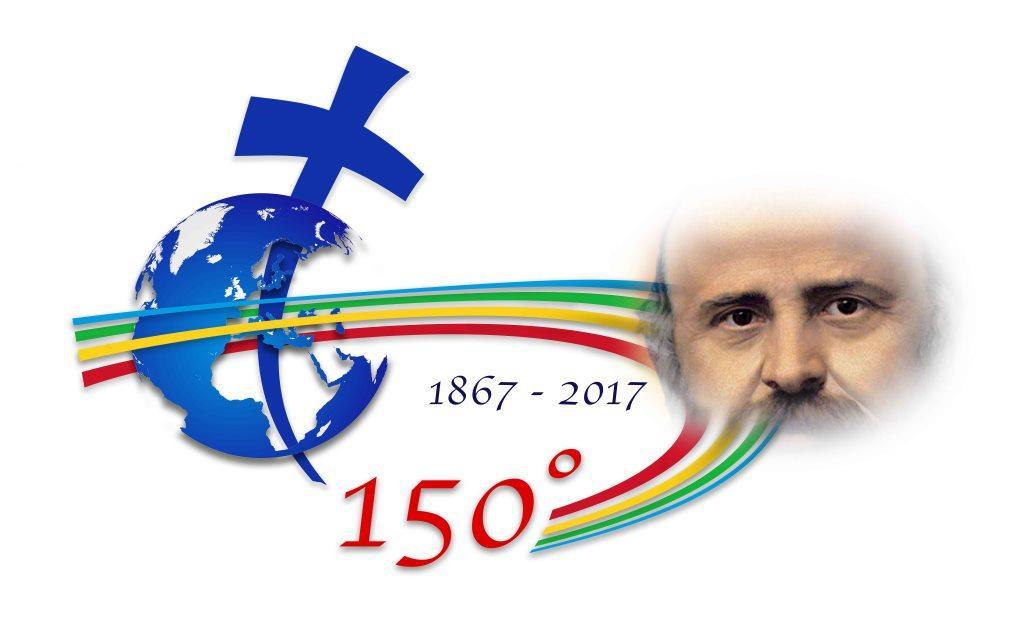Daniel Comboni
Comboni Missionaries
Institutional area
Other links
Newsletter
The day of the election of Benedict XVI
- Comboni lived out his call under the sign of the Cross, through suffering, obstacles and misunderstandings, convinced that “the works of God are born and grow at the foot of Calvary” (RL 4).
- The missionary places the crucified, risen and living Lord at the centre of his life, for he believes that the power of Christ is revealed in the weakness of the Apostle: “That is why I am quite content with my weaknesses, and with insults, hardships, persecutions and the agonies I go through for Christ's sake. For it is when I am weak that I am strong” (RL 4.1).
- In numerous situations of poverty, neglect and death, Comboni finds in the crucified Christ the effective presence of the God of Life, and a multitude of brothers and sisters to love and to esteem, bringing them the Gospel. They become his only passion (AC ’03, 34).
The Cross of hope in Comboni
In reading through the letters of Comboni we are immediately struck by his insistence that the cross is a grace of Providence for the good of and faithfulness to Mission. It is an intuition that Comboni shows to have assimilated in his own life ever since his first missionary journey in Africa, when he was only 27 years of age.
Comboni was able, through a strong vision of faith, to transform into crosses sent by Providence any kind of tribulation, suffering or hardship associated with mission.
This spirituality of the cross helped him to carry on with his mission work in Central Africa.
Seven days before his death, on 3rd of October 1881, he wrote: “My God! Always crosses! All these crosses weigh terribly on my heart; but they also increase its strength and determination to fight the battles of the Lord. (…) All the Catholic missions that have yielded good fruits have grown in this way… have prospered in this way and have become stronger and developed in this way, in the midst of death, adversity and beneath the shadow of the tree of the cross…” (W 3202-3203).
Comboni certainly was not “a fanatic of the cross”, one who enjoyed suffering for its own sake. He believed in the “evangelical” cross and not in crosses “that come from our foolishness” (W 1710) or “caused by our imprudent behaviour” (W 3136). Comboni never looked for useless crosses. He knew, though, that to place oneself in God’s service for the mission meant to encounter opposition, misunderstandings, discouragement and obstacles. We may say that the following was Comboni’s reasoning: if to work for the Mission in Central Africa I must walk “through the valley of darkness”, if for the sake of the mission I have to bear a thousand crosses, I will welcome any type of cross. What matters to me is the mission. The crosses do not scare me, provided these are the only means to carry out the work God has inspired me to do. A month before his death he wrote: “I am afflicted by great tribulations, for thus it pleases the Lord Jesus. (…) What a cross for a Missionary Bishop! Nevertheless, if we could understand why God acts in this way, we would praise and bless Him” (W 3173-3174).
The temptation of a comfortable cross
The great temptation of a pagan-christian, nowadays, is this: Let us make a more comfortable Christ; a Christ who may be understood, a Christ less demanding and less covered in blood. Let us preach a faith with fewer crosses, a faith that takes shortcuts, so that it does not have to pass through Calvary.
Christ, though, teaches us that we must not make his Gospel’s message sweeter: “If anyone wants to be a follower of mine, let him renounce himself, take up his cross and follow me” (Mt. 16,24). It is impossible to believe and live our faith without the courage to point at the cross and at the crucifix as the pillars of our Christian life and the companions in our missionary labour.
Tonino Bello, a bishop who made his home beneath the cross, reminds us that “People were saying to Christ: if you are the Son of God, come down from the cross and we will believe in you. Today the world is saying to the Church: remain on the cross, because if you think of pulling out the nails and of coming down, making, perhaps, a small throne out of the cross and become a sedentary Church, one that likes security, then we will no longer believe in you.”
Either the Christians are heirs of the Crucified or they are no longer Christians, wrote Moltmann. We may then say that either the missionary is an heir of the Crucified or he is not a missionary. Comboni wrote: “The cross is a conditio sine qua non for a missionary” (W 6751). It is true, nevertheless, that the cross is meaningless without a purpose. And its purpose is love. The cross is love: love of ideals and love of people, it is to embrace hardships, suffering and crosses wholly out of love. The cross is useless if it is not evangelical. The cross Christ spoke about is one that we must bear with “evangelical wisdom”, one that makes us understand how suffering always has a purpose, namely the good of others and our own good. The cross is to give everything, to give ourselves without limits.
As missionaries we have met and shall meet many crosses on our life’s journey. We are asked to “carry” the cross, which generates love, hope, truth, freedom and redemption for us and for others.
The cross triumphs in love
Many were the crosses that the missionary Daniel Comboni had to bear on his shoulders in order to remain faithful to his vocation and to mission.
Comboni grows in his holiness even in the midst of many hardships. Comboni formulates in a clear way and personally assimilates a dynamic spirituality of the Cross. He becomes ever more convinced that God’s works are never easy, humanly speaking, and that tribulations are a sure sign of a blessing on any missionary effort.
Behind the trials of missionary life, behind the limits, meanness and injustices of people, Comboni always managed to see the hand of Providence guiding towards higher and unthinkable peaks his soul and his work in Africa. It is through this kind of faith that was born and grew the authentic saint whom we today admire and whom John Paul II, on the day of his canonisation, proposed as a missionary example to follow and to imitate.
The cross, a question of love
To Comboni, therefore, mission means love; it is a question of love. So it must be for us, his children and his disciples.
A question of love: to leave one’s own home and country and language to live a deep sense of exile, to look for and to restore God’s image on the face of those who weep and suffer in the most forgotten lands.
A question of love: to jealously link our own destiny with that of the “poorest and most abandoned”, under the seal of the cross.
A question of love! Love without limits. Love even conquers death. Because of this, after over a century tortured by wars, conflicts, injustices, persecutions and blood… Comboni lives on to teach us that it is worthwhile “to give one’s life for the mission of Christ and for Christ.”
It is worth giving ourselves. Without limits.
19 April 2005
The day of the election of Benedict XVI
Fr. Teresino Serra, mccj
Superior General
- The missionary places the crucified, risen and living Lord at the centre of his life, for he believes that the power of Christ is revealed in the weakness of the Apostle: “That is why I am quite content with my weaknesses, and with insults, hardships, persecutions and the agonies I go through for Christ's sake. For it is when I am weak that I am strong” (RL 4.1).
- In numerous situations of poverty, neglect and death, Comboni finds in the crucified Christ the effective presence of the God of Life, and a multitude of brothers and sisters to love and to esteem, bringing them the Gospel. They become his only passion (AC ’03, 34).
The Cross of hope in Comboni
In reading through the letters of Comboni we are immediately struck by his insistence that the cross is a grace of Providence for the good of and faithfulness to Mission. It is an intuition that Comboni shows to have assimilated in his own life ever since his first missionary journey in Africa, when he was only 27 years of age.
Comboni was able, through a strong vision of faith, to transform into crosses sent by Providence any kind of tribulation, suffering or hardship associated with mission.
This spirituality of the cross helped him to carry on with his mission work in Central Africa.
Seven days before his death, on 3rd of October 1881, he wrote: “My God! Always crosses! All these crosses weigh terribly on my heart; but they also increase its strength and determination to fight the battles of the Lord. (…) All the Catholic missions that have yielded good fruits have grown in this way… have prospered in this way and have become stronger and developed in this way, in the midst of death, adversity and beneath the shadow of the tree of the cross…” (W 3202-3203).
Comboni certainly was not “a fanatic of the cross”, one who enjoyed suffering for its own sake. He believed in the “evangelical” cross and not in crosses “that come from our foolishness” (W 1710) or “caused by our imprudent behaviour” (W 3136). Comboni never looked for useless crosses. He knew, though, that to place oneself in God’s service for the mission meant to encounter opposition, misunderstandings, discouragement and obstacles. We may say that the following was Comboni’s reasoning: if to work for the Mission in Central Africa I must walk “through the valley of darkness”, if for the sake of the mission I have to bear a thousand crosses, I will welcome any type of cross. What matters to me is the mission. The crosses do not scare me, provided these are the only means to carry out the work God has inspired me to do. A month before his death he wrote: “I am afflicted by great tribulations, for thus it pleases the Lord Jesus. (…) What a cross for a Missionary Bishop! Nevertheless, if we could understand why God acts in this way, we would praise and bless Him” (W 3173-3174).
The temptation of a comfortable cross
The great temptation of a pagan-christian, nowadays, is this: Let us make a more comfortable Christ; a Christ who may be understood, a Christ less demanding and less covered in blood. Let us preach a faith with fewer crosses, a faith that takes shortcuts, so that it does not have to pass through Calvary.
Christ, though, teaches us that we must not make his Gospel’s message sweeter: “If anyone wants to be a follower of mine, let him renounce himself, take up his cross and follow me” (Mt. 16,24). It is impossible to believe and live our faith without the courage to point at the cross and at the crucifix as the pillars of our Christian life and the companions in our missionary labour.
Tonino Bello, a bishop who made his home beneath the cross, reminds us that “People were saying to Christ: if you are the Son of God, come down from the cross and we will believe in you. Today the world is saying to the Church: remain on the cross, because if you think of pulling out the nails and of coming down, making, perhaps, a small throne out of the cross and become a sedentary Church, one that likes security, then we will no longer believe in you.”
Either the Christians are heirs of the Crucified or they are no longer Christians, wrote Moltmann. We may then say that either the missionary is an heir of the Crucified or he is not a missionary. Comboni wrote: “The cross is a conditio sine qua non for a missionary” (W 6751). It is true, nevertheless, that the cross is meaningless without a purpose. And its purpose is love. The cross is love: love of ideals and love of people, it is to embrace hardships, suffering and crosses wholly out of love. The cross is useless if it is not evangelical. The cross Christ spoke about is one that we must bear with “evangelical wisdom”, one that makes us understand how suffering always has a purpose, namely the good of others and our own good. The cross is to give everything, to give ourselves without limits.
As missionaries we have met and shall meet many crosses on our life’s journey. We are asked to “carry” the cross, which generates love, hope, truth, freedom and redemption for us and for others.
The cross triumphs in love
Many were the crosses that the missionary Daniel Comboni had to bear on his shoulders in order to remain faithful to his vocation and to mission.
Comboni grows in his holiness even in the midst of many hardships. Comboni formulates in a clear way and personally assimilates a dynamic spirituality of the Cross. He becomes ever more convinced that God’s works are never easy, humanly speaking, and that tribulations are a sure sign of a blessing on any missionary effort.
Behind the trials of missionary life, behind the limits, meanness and injustices of people, Comboni always managed to see the hand of Providence guiding towards higher and unthinkable peaks his soul and his work in Africa. It is through this kind of faith that was born and grew the authentic saint whom we today admire and whom John Paul II, on the day of his canonisation, proposed as a missionary example to follow and to imitate.
The cross, a question of love
To Comboni, therefore, mission means love; it is a question of love. So it must be for us, his children and his disciples.
A question of love: to leave one’s own home and country and language to live a deep sense of exile, to look for and to restore God’s image on the face of those who weep and suffer in the most forgotten lands.
A question of love: to jealously link our own destiny with that of the “poorest and most abandoned”, under the seal of the cross.
A question of love! Love without limits. Love even conquers death. Because of this, after over a century tortured by wars, conflicts, injustices, persecutions and blood… Comboni lives on to teach us that it is worthwhile “to give one’s life for the mission of Christ and for Christ.”
It is worth giving ourselves. Without limits.
19 April 2005
The day of the election of Benedict XVI
Fr. Teresino Serra, mccj
Superior General




